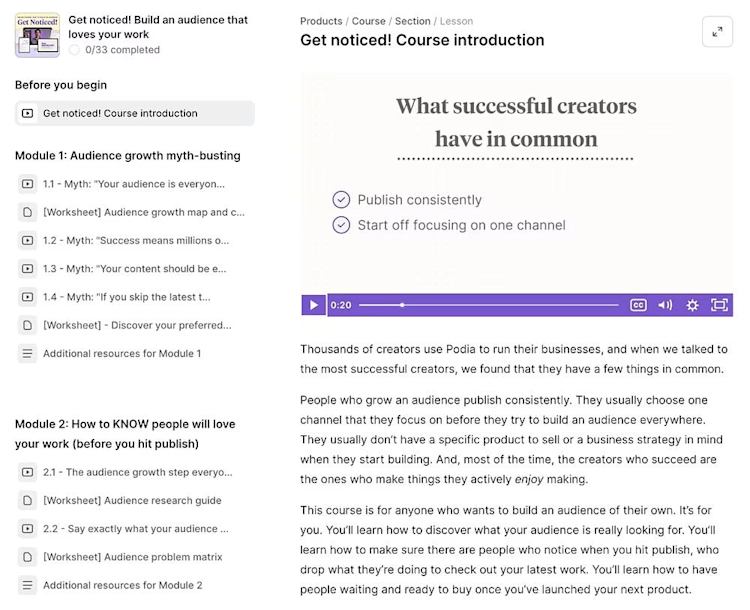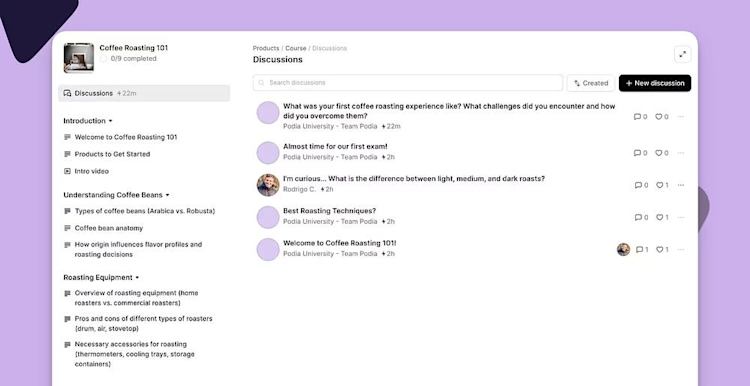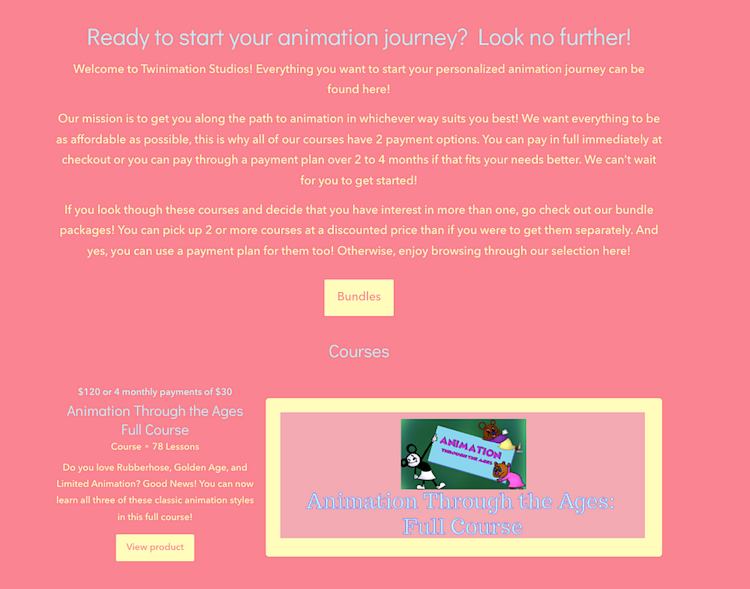If you’re looking for an online course platform, you might think all you need is a place to upload your content and start selling. But do you just want to build a course? Or do you want to build a business around your course?
For solo business owners, a course platform is often just one piece of the puzzle. You also need a complete system where you can sell what you know, grow an audience, and scale your revenue.
In this article, we’ll cover
-
The hidden costs of standalone course platforms versus all-in-one solutions
-
What features actually matter when you’re building a sustainable course business
-
Why thousands of creators are choosing all-in-one course platforms to plan for future success
By the end, you’ll have a path to evaluate course platforms based on your long-term business goals, giving you more control over your audience, products, and business.
The hidden cost of choosing the wrong online course platform
A lot of online course buying guides focus on lists of nice-to-have features. While this can be helpful, it doesn’t address how most people actually build businesses.
To sell an online course successfully, you need more than just a course builder. You also need:
-
A sales page to convert visitors into buyers
-
A checkout system with flexible pricing and payment options
-
Marketing tools to promote your course and grow your audience
-
Audience-building tools like lead magnets and email marketing
There are two ways you can set all of this up:
-
Piece together multiple specialized platforms: This lets you get ultra-specific with each tool but can come with more complexity and higher costs.
-
Use an all-in-one platform: This simplifies setup, reduces costs, and keeps everything connected in one place.
Both approaches have benefits, and the best choice depends on your business needs. If you want deep customization, a standalone setup may be ideal. But keep in mind, with the piece-by-piece approach, costs can balloon quickly.
In addition to your standalone course platform, you could find yourself needing add-ons like third-party email marketing software (Kit, Mailchimp), landing page builders (Leadpages, Clickfunnels), community platforms (Circle, Mighty Networks), website and blogging tools (WordPress, Wix), and affiliate management software (ThriveCart).
Each additional tool you add comes with separate costs, integrations, and setup time.
On the flip side, if you prefer simplicity and automation, an all-in-one platform like Podia can streamline your workflow. This approach gives you an easy-to-use set of tools that you can manage in one place, so you have room to grow and experiment without having to learn new software.
No matter which option you choose, here’s a piece of advice based on what we’ve seen watching over 150,000 entrepreneurs build businesses on Podia:
Plan for the business you want to build, not just where you are today.
Right now, you might be fine with selling just one course, but what happens when that course takes off and you have an idea for another one? You don’t want to be stuck rebuilding everything on a new platform or paying for tons of extra add-ons just because your business is growing.
That’s a weird punishment for success.
Instead, think about what future you and your future business will need. With that in mind, here are the key things to consider as you create your course and build a long-term plan to sell it successfully.
What features do you actually need to build a successful online course business?
Whether you go piece-by-piece or all-in-one, make sure you have everything you need to build your entire business, not just your course. Here are the features to look for.
#1 Course creation and delivery
What to look for:
-
Unlimited courses and students (so you don’t hit arbitrary limits later)
-
Support for multiple content formats (videos, text, quizzes, downloads, embeds)
-
Flexible course structures (self-paced, cohort-based, live, drip content)
-
Interactive elements (comments, community features, discussions)
Okay, we’ll start with the obvious. Your course platform needs to be able to support the courses you make today and hope to make in the future.
Unlimited courses and students
The first thing to look out for is course limits. Some platforms set a limit on the number of courses you can make, which could be a big issue down the line as your business grows. But with unlimited courses (and unlimited students), you can make whatever you want, and you won’t have to migrate to a new platform when your next great idea hits.
Multiple content formats
Within your courses, you should be able to add modules and lessons with lots of different content formats, like text, videos, images, files, quizzes, and audio. Depending on your topic, you might also want the option to embed slideshows, spreadsheets, playlists, podcasts, and other media.

For instance, the course pictured above uses a combination of videos, text, and downloadable worksheets to help people build an audience for their work.
Flexible course structures
Having diverse course structures, like self-paced options, cohort courses, live sessions, and drip courses also gives you more flexibility as you grow.
For example,
-
A cohort program makes the most sense if you want to work with a smaller group of students for a set time. This is also helpful if you plan to include live sessions within your courses.
-
A self-paced or evergreen course can be available any time as a source of passive income.
-
With a drip course, you can set up all your modules and lessons upfront and slowly release them to students over time. This helps prevent overwhelm with bigger courses.
Even if you don’t know what kind of online course you want to make just yet, look for a platform that has lots of options, so you aren’t limited as you grow.
Interactive course elements
On top of that, consider tools with interactive elements for your course students, like comments, discussions, and community areas. These features let students collaborate, network, and build bonds through your program, which could mean more engagement and student satisfaction.

You may be thinking, I don’t need all this right now. I just need to make a basic course!
And that might be true, but what happens in a few weeks when that course is a success and you want to make another idea? Picking a platform with lots of course options means you don’t have to move in the future, and you aren’t limited by what you can make.
So let’s keep looking out for future you and talk about how you’re going to sell your course.
#2 Selling your online course
What to look for:
-
Landing pages and sales pages to convert visitors into customers
-
Multiple pricing options (one-time payments, subscriptions, payment plans)
-
Preselling and waitlists to build hype before launch day
-
Upsells, bundles, and discounts to increase revenue per customer
-
Affiliate marketing to let others promote your course
You can create the greatest course in the world, but people still need a way to learn about it and buy it.
Landing pages and sales pages
Sales pages and landing pages are where you’ll tell people exactly what’s included in your course. This page should connect directly to your checkout page where they can put in their card info and buy.
The type of sales page you design will depend on the content of your courses, so look for a tool that lets you add things like text, videos, images, testimonials, FAQs, CTAs, and anything else you need to get your point across.
For instance, Signature Edits sells courses for photographers, and they have a landing page with tons of images showing what you’ll learn in their Lightroom mastery course. They also show the course curriculum and let prospects view the first two lessons as a preview, which is a great taste of what the course entails.
(I’m not even a photographer and I’m excited to take this course after watching the preview!)

Lane from Lane Rado Creative uses big bold images, bright colors, testimonials, and FAQs to promote her Canva Confident course, which makes sense because the course is all about creating better imagery and branding for your business.

Two different courses need two very different sales pages, and being able to customize the layout and unique elements for each product gives you a better chance of converting customers.
Now let’s say someone has seen your landing page and is ready to buy… you need to have checkout and payment features in place for them to do that.
Pricing options
The next thing you’ll need to sell your course is a checkout page and the ability to connect different payment processors (like Stripe and PayPal). You should have the option to set up multiple pricing options, like one-time payments, subscriptions, and payment plans.
Waitlists and preselling
And there’s even more you can do to enhance the sales process for your course. Preselling programs and building product waitlists can help you have bigger and more exciting launches.
-
Preselling: You let people buy your course before it’s ready and give them access when you’ve finished building it.
-
Waitlist: Build a list of people who want to buy your course when it’s live and send them a special message letting them know it’s ready.
Canva and Instagram expert Em Connors used waitlists to build hype around one of her first course launches. She grew her list with people from Instagram who were interested in learning more, and on launch day, she ended up bringing in 5-figures in sales.

These tools will help future you test new course ideas and find out what your audience is most interested in, before sinking tons of time into making a new course.
Upsells, bundles, and discounts
Upsells are a great way to earn more money from each sale because they let you promote another product right at checkout. If you have multiple courses (or other products) that are related, make sure your customers don’t miss them with upsells.
You can also add value for your customers with product/course bundles or incentivize them to purchase with coupons or discounts. Again, you may not use all these features from day one, but it’s a good idea to have them in your toolbox when you need them.
Affiliate marketing
Finally, your online course platform should give you opportunities to scale your business and expand your income long-term.
One of the best ways to do that is with affiliate marketing, where you can let happy customers promote your course in exchange for a commission. This gives you more eyes on your work without paying for more marketing and rewards your customers for their support.
Speaking of marketing, the next thing to think about when building your online course business is how you’ll grow your audience and market your course.
#3 Growing your audience and marketing your course
What to look for:
-
Built-in email marketing (newsletters, automated sequences, sales funnels, segmentation)
-
Lead magnets (free resources to grow your email list)
-
SEO-friendly blogging and website tools (so you can attract organic traffic)
Even if you have the best course launch in history, you’ll still need a way to keep new customers coming your way in the future. The good news is that you can do this on autopilot with a few key features.
Email marketing and sales funnels
Your email list is one of your most valuable tools as an online course creator. This is where you can keep up with people who interact with and buy from your business. Maybe they join your free course, maybe they opt into your newsletter, or maybe they are a customer — an email list gives you a space to stay in touch with everyone.
How can you use email marketing to grow your online course business?
-
Add an email sign-up form on your website, link in bio, or anywhere else you promote your business. When someone joins your email list, run an automated welcome sequence over several days. In that sequence, introduce yourself and your business, and let newcomers know about your courses and paid products to drive sales.
-
When you have course updates, let your students inside that course know with an email blast. You can also email everyone on your list about the update to encourage new purchases.
-
If people on your list haven’t bought your course yet, periodically send them automated emails reminding them what they could learn in your program. (Pro tip: Look for an email marketing tool that lets you filter your audience based on what they’ve bought from you so you can send specialized campaigns.)
-
Perhaps most importantly, send regular newsletters, stay top of mind, and continually provide value for your people.
Course expert Glen Long uses email marketing to give students an ultra-fast win, even if they haven’t bought his paid program yet. When someone signs up for his Course Builder Starter Pack on his website, they automatically get access to course tips, a video training sprint, and his newsletter with helpful info about course creation.
From there, whether or not they buy, he has an active list of people who are interested in his topic, and he can share new products and updates with them in a few clicks.

The best part? Unlike social media algorithms that can change at any time, your email list is yours.
As creativity coach Cindy Cisneros puts it, “I’ve noticed that my email open and click rates are high, and I can easily nurture and grow my audience using filters and campaigns that link back to my courses, services, announcements, promotions, and more. It’s a clear, effective, and user-friendly way to stay connected — something that felt lost when I relied solely on social media.”
Lead magnets
A lead magnet is a free resource that you give away in exchange for someone’s email address. After they sign up, you can add them to your email list and send out an email marketing sequence that promotes your business and paid programs.
When you have a lead magnet related to your course, you’ll naturally be attracting target audience members into your business. They’re already interested in the topic your course covers, which makes your sales pitch a no-brainer. (More about building a lead magnet in this article)
Blogging and website tools
Your blog is a great place to share helpful information about your course topic for free. Blogs give you space to answer your target audience’s questions and score some sweet search traffic, and you can add promos for your lead magnet or paid courses within your blog content. This will keep a steady stream of new clients finding and buying your course.
(And if you have these features already built into your course platform, it’s easy to promote your products in the same place as everything else.)
#4 Add additional product types
What to look for:
-
Digital downloads (workbooks, templates, guides, ebooks)
-
Webinars (either live or pre-recorded)
-
1:1 coaching sessions
-
Community memberships (so students can stay engaged long-term)
It’s pretty rare to see a business make just one course and call it a day. That’s why, in addition to having unlimited courses, it’s also a great idea to have more product types in your online course business.
Because what starts as an online decluttering course can quickly become decluttering workbooks, a 30-day tidying challenge, 1:1 home organization coaching, a community to share before and after pictures, and lots of other exciting things — but only if you have the space and software to set it up.
So either pick a platform that includes other digital product types, like digital downloads, coaching, community, webinars, or other content so that you can make whatever you want, or plan to add additional product tools to your business.
As your course gains momentum and you get feedback from customers, you want to be able to set up accompanying programs and expand your income.
All-in-one vs. standalone: What’s the real difference?
As you build your online course and a business to support it, you can choose between an all-in-one platform that does everything we talked about above, or you can find individual tools and connect them yourself.
You might have come into this article thinking you were looking for just an online course platform, but it’s also important to think about how you’ll grow your audience and scale long-term.
At Podia, one piece of feedback we constantly hear from our +150,000 solo business owners is that having everything in one place makes it easier to focus on making great products and providing value.
There’s nothing worse than having a great idea for your business and feeling limited by the tech you’ve chosen, so by picking something that has everything you need from day one, you’re setting yourself up for ease and success.
Twinimation Studios, for example, had to move away from a course platform that only offered one course on the free plan, and paid plans had a huge jump in price. Instead, they went with Podia because the Mover plan was more affordable and had unlimited courses and other product types, allowing them to grow in the future.
“We use Podia to host our art-based courses primarily focused on animation, but soon to include illustration, comics/manga, and more. We will also soon begin hosting workshops to share more about the art world from a business perspective to encourage entrepreneurship. We want this to branch out to coaching in the future as well. We also use the digital downloads section to sell eBook versions of our educational activity books.”

And Cindy Cisneros from The Creativity Courses uses multiple product types to guide her customers through her signature offering.
Participants start with a free self-paced course. Once they’ve completed it, Cindy directs them to her membership community. Finally, customers have the option to join a subscription program with different levels of courses and live monthly sessions.
Cindy says, “What first caught my attention about Podia was its seamless integration of courses and community, along with the flexibility to offer courses in various formats — written content, videos, and downloadable materials. I loved that I could customize these into scalable learning levels and sell them individually or as part of a subscription.”

This system of moving customers through different programs over time wouldn’t be possible with a platform that only offered basic courses.
So plan for your future success by picking a platform that has everything you need in one place. As you grow with more courses, products, and business adventures, you can expand in whatever direction you want without needing to learn all new software.
(We built Podia with everything connected so you can set up as many courses, products, and offers as you like. You can also automatically generate beautiful sales pages for each item, create new blog posts, build your email list, set up lead magnets, and run affiliates, all in one place. Start your 30-day free trial today.)
How to choose the best course platform for long-term success
At the end of the day, you’re not just building an online course. You’re building a business. That’s why it’s important to plan for your future success now as you choose what platform you’ll build on.
We recommend looking for an online course platform with the following:
-
Course creation and delivery tools
-
Landing page and sales pages
-
Selling features like waitlists, upsells, bundles, and affiliates
-
Email marketing and lead magnets to grow an audience on autopilot
-
Additional product types like coaching, webinars, and downloads
We set up Podia to do all this for your course business and more, plus you can try everything free for 30 days to see if it’s the right fit for you. Start building courses — and a business you love — today.



